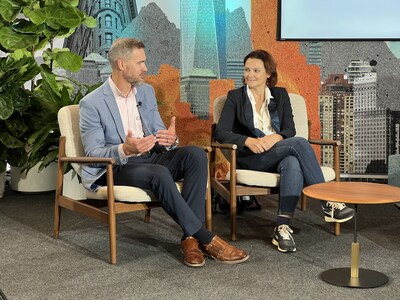Kellanova, Vice President and Chief Research and Development Officer, Dr. David Lestage, shares insights on how collaborative resilience, science, and technology are paramount in building resilient food systems.
CHICAGO, Oct. 16, 2025 /PRNewswire/ -- There's a growing sense that the way we think about food, climate, and resilience is finally changing. What once felt like fragmented conversations — about risk, sustainability, and innovation — is now converging into one urgent narrative. Science, technology, and research and development (R&D) aren't side notes anymore. They are becoming the foundation of how we urgently need to reimagine the future of food.
Artificial intelligence (AI) is a powerful accelerant in this shift. What once seemed futuristic is quickly becoming a reality: digital twins that anticipate vulnerabilities, sensors that monitor ecosystems in real-time, and autonomous systems that construct renewable infrastructure. AI is helping us move beyond simply understanding climate risk to actively designing resilience. It is pushing the pace in ways humanity has not managed before.
And yet, technology alone will not carry us forward. Resilience is not invented in a lab or engineered in isolation. It is built on the connections between us — across industries, geographies, and disciplines. Companies cannot do this alone. Coalitions will define the future, and collaboration is no longer optional; it is essential.
One of the most overlooked yet powerful actors in this story is the consumer. Innovation is not just an invention; it is adoption. A farmer can change their practices, a company can redesign its products, and policymakers can shape incentives. But resilience only takes root if consumers choose it. Every purchase is a signal to the market: to reward sustainable practices, to normalize new foods, to hold companies accountable. Our challenge, and our opportunity, is to meet people where they are and design foods that make the sustainable choice also the most delicious, convenient, and affordable. When consumers move, the system moves.
At Kellanova, we've seen the power of working in coalition, and it is a key pillar of how we're bringing our Better Days Promise to life. For example, our Origins program brings NGOs, governments, suppliers, and academics together to source key ingredients more sustainably and equitably. These efforts are not simply projects; they are proof that resilience happens when value is shared across the chain, not hoarded at the top.
Still, barriers remain. Regulations rooted in the 1930s often block the use of better-for-you or more sustainable ingredients. Approval processes for novel foods can stretch for years, discouraging investment and slowing innovation. Outdated standards create confusion instead of clarity. If we want a food system that reflects today's realities, regulation must evolve alongside innovation.
Finance is another barrier. Resilience requires new models of co-investment, where the risks and rewards of transformation are shared. Last year, we collaborated with agribusiness Bartlett and Ahold Delhaize USA on regenerative wheat farming, supporting local farmers in adopting climate-smart practices while reducing Scope 3 emissions.
With ADM, we've invested in regenerative cotton across the U.S. South, helping farmers implement cover crops and preserve biodiversity. Together, these programs are reducing greenhouse gases, sequestering carbon, and demonstrating how collaboration can mitigate future risks.
Building resilience is not just about science or business; it's about embracing a holistic approach. It is about trust, urgency, and shared accountability. It's about ensuring that global goals translate into local action, that smallholder farmers are equipped with the necessary tools and training, and that metrics are standardized so that progress can be measured and scaled. It's about designing a food system that can withstand volatility while nourishing billions of people.
A single company, invention, or regulation will not define the future of food. It will be determined by how quickly we can connect science, innovation, and technology into a system built for resilience. That convergence is no longer theoretical — it's happening now.
About Kellanova
Kellanova (NYSE:K) is a leader in global snacking, international cereal and noodles, and North America frozen foods with a legacy stretching back more than 100 years. Powered by differentiated brands including Pringles®, Cheez-It®, Pop-Tarts®, Kellogg's Rice Krispies Treats®, RXBAR®, Eggo®, MorningStar Farms®, Special K®, Coco Pops®, and more, Kellanova's vision is to become the world's best-performing snacks-led powerhouse, unleashing the full potential of our differentiated brands and our passionate people.
At Kellanova, our purpose is to create better days and ensure everyone has a seat at the table through our trusted food brands. We are committed to promoting sustainable and equitable food access by tackling the crossroads of hunger, sustainability, wellbeing, and equity, diversity & inclusion. Our goal is to create Better Days for 4 billion people by the end of 2030 (from a 2015 baseline). For more detailed information about our commitments, our approach to achieving these goals, and methodology, please visit our website at https://www.kellanova.com.
![]() View original content to download multimedia:https://www.prnewswire.com/news-releases/building-resilient-food-systems-302585736.html
View original content to download multimedia:https://www.prnewswire.com/news-releases/building-resilient-food-systems-302585736.html
SOURCE Kellanova

